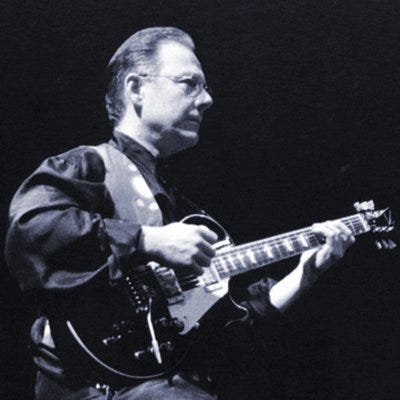In late 1974, Robert Fripp, disillusioned with the music industry and convinced he needed to prepare for what he believed would be a radical shift in the world by 1981, disbanded King Crimson at the height of their powers. This, and his self-imposed sabbatical from music, were intended to be permanent. After finishing the second Fripp & Eno album, Evening Star, and playing some guitar on Eno’s Another Green World, including an outstanding solo on “St. Elmo’s Fire,” he retreated from the music industry. He moved into Sherborne House, and under J. G. Bennett, he learned the strange philosophy of George Gurdjieff. This didn’t last long though, and a year later he was asked to perform on Car, the first solo album of Peter Gabriel, who had recently left Genesis. From here on until King Crimson reformed in 1981, Fripp participated in a series of interesting collaborations that brought him back to the music industry.
Soon, Eno was calling Fripp to come to Berlin to contribute to David Bowie’s “Heroes” album. He worked again with Gabriel, producing his second solo album, the criminally underrated Scratch. This began a Fripp production trilogy that included Daryl Hall’s (yes, that Daryl Hall) Sacred Songs, recorded in 1977 but shelved until 1980 due to conflicts with Hall’s management. This culminated in Fripp’s 1979 solo album Exposure. The album was set to include Hall on most of the album, but again due to disagreements with Hall’s management, his role was reduced to two tracks. One of these, “North Star,” is a dry run of sorts for King Crimson’s “Matte Kudasai.” Elsewhere there are complex Crimson-esque instrumentals (“Breathless”), ambient Frippertronics (“Water Music” and “Urban Landscape”) and a vastly superior version of Gabriel’s “Here Comes The Flood,” which appeared on Car, marred by Bob Ezrin’s bombastic production.
Now living in New York, he contributed guitar to tracks from two younger New York bands, Blondie (“Fade Away (And Radiate)” from Parallel Lines) and Talking Heads (“I Zimbra” from Fear of Music). He also played on a few tracks from Gabriel’s Melt and the majority of Bowie’s Scary Monsters (And Super Creeps). Finally, in 1980 he formed a new band with ex-Crimson drummer Bill Bruford, guitarist Adrian Belew, who had worked with Zappa, Bowie and Taking Heads, alongside bassist Tony Levin, who had played on Gabriel’s records. This band, originally called Discipline, became a reformed King Crimson. With this, a new era of King Crimson, and Robert Fripp’s career, had begun.




